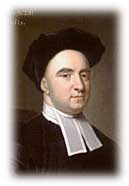 |
EndowmentsFirst
Professorship
EndowmentsFirst
Professorship
|
The First Scholarship Fund Yale turned payments from the plantation into its first set of scholarships. At this time, the plantation likely continued being worked by slaves. Charles Handy leased Whitehall farm from Yale, and sent Yale payments that would fund scholarships (17). The Rhode Island census, in 1774, shows that the household of Charles Handy included: "Blacks: 4" (18). It is likely that these four black people included in Handy's household were slaves. In his study of slavery in the 1774 Rhode Island census, Louis Masur explains:
The density of slave owning white households in Newport county in 1774 was almost as high as the density of slave owning white households in the American South during the Civil War (20). It would be normal for someone farming a Newport plantation to use slaves to work the land (21). Words etched into the floor of Berkeley College today explain:
George Berkeley had slaves working his plantation until he left in 1731. The profits earned by leasing the Whitehall plantation after 1732 funded Yale's first scholarships. The person leasing the plantation around the time of the 1774 census included four black people as members of his household, and most black people so listed were slaves. Assuming slaves worked the old Berkeley plantation, then Yale's own land was worked by slaves, and Yale's first scholarship was funded for up to 50 years with money earned from slave labor. It is for the gift of this plantation that his name is honored today with the name of "Berkeley college". Berkeley's SlavesAfter coming to the colonies, Berkeley bought a plantation in Newport, Rhode Island-the famous "Whitehall." On October 4, 1730, Berkeley purchased "a Negro man named Philip aged Fourteen years or thereabout." A few days later he purchased "a negro man named Edward aged twenty years or thereabouts." On June 11, 1731, "Dean Berkeley baptized three of his negroes, 'Philip, Anthony, and Agnes Berkeley' " (16). Berekley's sermons explained to the colonists why Christianity supported slavery, and hence slaves should become baptized Christians:
In the 1930s, Yale named a new residential college after Bishop Berkeley. |
|
 Bishop
George Berkeley bought 3-5 slaves during his brief stay in the New World
between 1728 and 1731, to work on
Bishop
George Berkeley bought 3-5 slaves during his brief stay in the New World
between 1728 and 1731, to work on